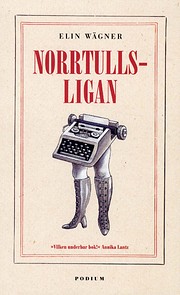

Fai clic su di un'immagine per andare a Google Ricerca Libri.
|
Sto caricando le informazioni... Stockholm Stories: Men and Other Misfortunes (1908)di Elin Wägner
 Nessuno Sto caricando le informazioni...
Iscriviti per consentire a LibraryThing di scoprire se ti piacerà questo libro. Attualmente non vi sono conversazioni su questo libro. nessuna recensione | aggiungi una recensione
Welcome to the Xlibris Bookstore Website for STOCKHOLM STORIES. The book contains two lively, witty novels by Elin Wägner of Sweden: Men and Other Misfortunes and Stormy Corner. To get the story behind the Stories, read excerpts, or order copies, please read on! Who Was Elin Wägner? Elin Wägner, author of Men and Other Misfortunes and Stormy Corner, was born in Lund in southern Sweden in 1882. Her mother died when she was three. Although an aunt came to fill the gap, Elin felt the loss all her life and expressed it in many ways in her writing. Her father, a minister and school principal, sent her brother Harald to university but refused to do the same for Elin. She dropped out of high school in anger. After serving as her father´s secretary for a short time, she created her own career in journalism, starting as a reviewer and reporter for a local paper. Before long she moved to Stockholm, where for many years she was a successful reporter, columnist, and reviewer for the liberal daily Dagens Nyheter. Wägner was one of the "New Women" prominent in the literature and culture of the early twentieth century in Europe and the United States. While continuing as a journalist, she began to write innovative fiction in the bold spirit of contemporaries she admired, among them Virginia Woolf, Charlotte Perkins Gilman, Olive Schreiner, and Vera Brittain. Wägner´s first novel Norrtullsligan (Men and Other Misfortunes in the translation) was originally a popular newspaper serial. In 1908 it came out as a book and was an immediate success for its witty and sympathetic depiction of the struggles of the new women office workers in the cities. A second novel, Pennskaftet (Penwoman), about suffragettes in Stockholm, appeared in 1910. The protagonist, a journalist, plans to maintain her independence in a liberated marriage as she continues to be active in the struggle for women´s rights. More than twenty books followed in the years before Wägner died in 1949. They included the powerful classic Åsa-Hanna and a two-volume biography of Selma Lagerlöf, the world famous novelist, who was the first woman member of the Swedish Academy. The second woman accorded that honor was Elin Wägner herself, in 1944. Wägner´s moral concerns grew in the years between the two World Wars. Inspired by Gandhi and English Quakers, she worked closely with other pioneers of international women´s peace organizations and was a co-founder of the Swedish branch of Save the Children. These experiences led to novels dramatizing the tragic course of world events and imagining solutions women and men could bring about together. An early example is Stormy Corner, the second novel in Stockholm Stories. The story takes place against the background of the last year of World War I, in neutral Sweden, which was blockaded, and also threatened by the Communist revolution in Russia. In 1949 Wägner´s book-length essay Väckarklocka (Alarm Clock) sounded a wake-up call for women to realize their potential to bring about world peace and save the environment. She was an environmentalist long before Rachel Carson published her Silent Spring. Wägner lived her last years in the home she had built in the province of Småland, writing and working with her friend Flory Gate, a pioneer in organic farming. Wägner´s books continue to be studied and enjoyed in Sweden and have been translated into French, German, Dutch, and Russian. She never succeeded in her lifetime, however, to realize her great desire to see her works appear in English. These translations in Stockholm Stories now introduce them to the wider audience they deserve. Story Summaries MEN AND OTHER MISFORTUNES In the early 1900s four educated unmarried young w Non sono state trovate descrizioni di biblioteche |
Discussioni correntiNessunoCopertine popolari
 Google Books — Sto caricando le informazioni... Google Books — Sto caricando le informazioni...GeneriSistema Decimale Melvil (DDC)839.7372Literature German and related languages Other Germanic literatures Swedish literature Swedish fiction 1900-1999 1900-1945Classificazione LCVotoMedia: (3.6) (3.6)
Sei tu?Diventa un autore di LibraryThing. |
||||||||||||||||||||||||||||||||||||||||||||||||||||||||||||||||||||||||||||||||||||||||||||||||||||||||||||||||||||||||
Att höja sina röster hjälper heller knappast: det är arbetsgivarnas marknad, och de vet det. Låga löner och närmanden, skrämseltaktik och patronisering. Undra på att man tröttnar.
Förordet av Annika Lantz påpekar hur lite det är som hänt, i alla fall vad gäller de grundläggande problemen. Samtidigt: skillnaderna är också stora. Lönerna är inte lika än, men ingen kan längre stå och försvara det rakt av. Kvinnliga arbetare ses inte längre som en samhällsfara. Det finns arbetsgivare beredda att utnyttja anställda, men det är något som måste skönmålas om det skall ses som acceptabelt. Elin Wägner skulle knappast vara nöjd idag, men hon skulle nog glädjas åt att saker bättrats. (